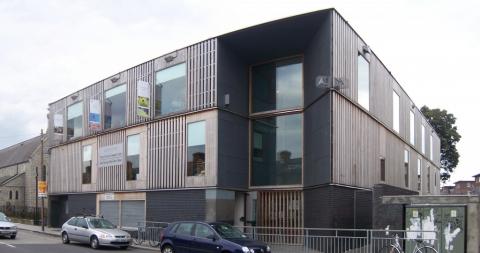Government fails to back drugs strategy with adequate funding

Community activists from Dublin have today criticised the cuts to the funding of local community and anti-drug schemes across the country.
Speaking at the launch of the Donore Community Drug Team (CDT) 2010-2013 Strategic Plan, activists and academics criticised the "lack of joined up thinking" exhibited by the government in its strategy thus far.
(Pictured: Donore Avenue Youth and Community Centre)
"The last year we've been hit severely," said Ferghal Connolly of the Donore CDT. "We're under the cosh here. We have a strategic plan but it needs to be funded." His statements were echoed by Dr. John Bissett, who compiled a report into harm reduction strategies for the Donore CDT which was also released today.
"How do you run projects if the government keeps taking slice after slice?" asked Bissett. "It's happening across the board...that's a lack of joined up thinking...[the government] takes all the resources from the places [with the greatest need]."
John Curran, the Minister of State with responsibility for the National Drugs Strategy, defended the government's programme of cuts. "Every government department had cutbacks... and [Community Development Projects] are being merged into one programme," said Curran. "I take the point that there are cuts...the challenge is maintaining front line services and how you go about doing that." He said the community projects continue and, indeed, have evolved.
The Donore CDT report recommends the implementation of harm reduction strategies across Ireland. Primary among these strategies would by the establishment of local needle exchange points.
Currently, it is the case that many injecting drug users have to travel to central exchanges such as Merchant's Quay to get clean needles, swabs, pipes and spoons. Sometimes, however, that is not possible and the result is a proliferation of infectious blood diseases such as HIV and Hepatitis C. The reports of Bissett and the Donore CDT agree that needle exchange points would help to tackle this issue.
In 2008, 8,718 individuals were on the Central Treatment Register for methadone maintenance treatment. 844 of them, or approximately 10 per cent, were from the south inner city of Dublin making it one of the most severely affected areas with regards to drug abuse in Ireland. Donore CDT, for its part, deals with 300 clients a year and makes over 3,000 interventions on their behalf.
The prevalence of conditions such as HIV and Hepatitis C among injecting drug users is exceptionally high. For example, there were 4,419 diagnosed HIV cases in Ireland in 2008, of which 1,327, or 30 per cent, were directly attributable to drug use. As well as this, seven out of ten injecting drug users receiving drug treatment test positive for Hepatitis C.
Donore CDT, with the support of Merchant's Quay Ireland and academics such as Bissett, hopes to reduce that prevalence in the Donore area by establishing a local needle exchange point.
"Harm reduction works," said Bissett. "Cities that have needle exchange points have lower instances of [infections blood diseases]." Minister Curran agreed that needle exchange points are established best practice across the world, and said plans are underway to establish 65 such points across Ireland.
Tony Geoghegan, of Merchant's Quay Ireland, highlighted the importance of needle exchange points. "When people come out the other end [of drug addiction], and they do come out the other end, it's important they don't come out with HIV, that they don't come out with Hepatitis C," said Geoghegan, stating that local service provision of exchange points is the best way to achieve this.
However, it more than just the provision of needles that exchange points would offer. For many injecting drug users, exchange points would offer a way of "linking into [other] services", namely drug counselling and rehabilitation programmes.
Bissett, however, summed it up best, saying that "harm reduction will save lives". While Minister Curran was effusive in his praise for the Donore CDT and the implementation of needle exchange points, the fact remains that many community projects have undergone severe cuts to the their funding since the economic downturn.
The minister's vocal support does not marry in smoothly with consistent funding cuts to community projects such as the Donore CDT. For many projects, the question is whether or not the funding will be there to implement their plans.
